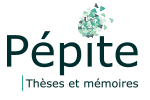John Neal, une écriture-frontière
John Neal's Frontier-Writing
- John Neal
- Frontière
- Etats-Unis
- Littérature américaine
- XIXe siècle
- 1776
- 1692
- Salem
- Sorcière
- Yankee
- Brother Jonathan
- Rachel Dyer
- Révolution
- Indépendance
- Bible
- Mensonge
- Nature
- Indien
- Rêveur
- Utilitarisme
- Cheveux
- Neal, John (1793-1876)
- John Neal
- Frontier
- United States
- American literature
- Nineteenth century
- 1776
- 1692
- Salem
- Witch
- Yankee
- Brother Jonathan
- Rachel Dyer
- Independence
- Bible
- Lie
- Nature
- Indian
- Dreamer
- Utilitarianism
- Hair
- Langue : Français
- Discipline : Études anglophones
- Identifiant : 2015LIL30029
- Type de thèse : Doctorat
- Date de soutenance : 04/12/2015
Résumé en langue originale
Cette thèse se propose d’étudier comment, à travers sa singulière écriture, John Neal, prenant son contemporain James Fenimore Cooper pour anti-modèle, ambitionne de réformer la littérature américaine, afin de satisfaire au besoin naissant d’indépendance et de renouveau national. Dans une certaine tradition américaine, la frontière est moins une limite territoriale qu’un seuil dynamique, un locus americanus, lieu de tous les possibles. Et c’est bien en ce sens que le romancier du Maine, homme des transgressions, homme de l’entre-deux, écrit «à la frontière» : entre littérature et engagement, entre la scène et la chaire, le masculin et le féminin, l’Indien et le Blanc, sa prose hésite, souvent. Il conviendra en somme d’analyser au plus près cette fabrique alternative de littérarité qu’est l’écriture nealienne, dans l’incertitude des commencements, lorsque l’expression du «génie national» prétend s’instaurer en critère de jugement et faire table rase des modèles d’importation.
Résumé traduit
This thesis explores how, through his singular writing style, John Neal, using fellow-writer James Fenimore Cooper as an anti-model, sets out to pioneer a thorough reformation of the so-called American literature, in an attempt to satisfy the ever-increasing need for independence and national renewal. In a certain American tradition, the frontier is less a territorial boundary than a « dynamic threshold », a locus americanus where wishful thinking comes true. Thus it is that this transgressive Maine author, a man of the neutral ground, or, rather, of the middle ground, writes «at the frontier»: between literature and committed literature, between the stage and the pulpit, the masculine and the feminine, or the Indian and the white man, his prose often wavers. Hence, our focus will be on the alternative literary vision for « the great Republic of Letters », encapsulated within Neal’s own writing, shaped as it was by the uncertainties of a nation in the making. Those were the days when «national genius» had an edge on European models. Those were John Neal’s days.
- Directeur(s) de thèse : Monfort, Bruno
- Président de jury : Amfreville, Marc
- Membre(s) de jury : Monfort, Bruno - Amfreville, Marc - Roudeau, Cécile - Ludot-Vlasak, Ronan
- Rapporteur(s) : Amfreville, Marc - Roudeau, Cécile
- Laboratoire : Centre d'études en civilisations, langues et lettres étrangères (Villeneuve-d'Ascq, Nord ; 2006-....)
- École doctorale : École doctorale Sciences de l'homme et de la société (Lille ; 2006-....)
AUTEUR
- Liagre, Sebastien


